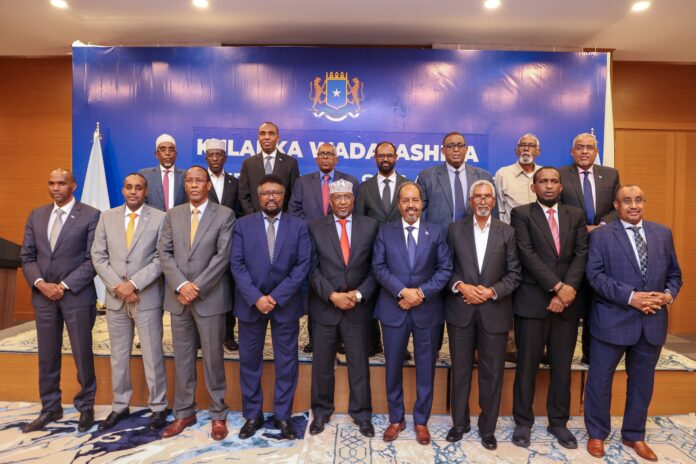MOGADISHU (KAAB TV) – In a bid to address the pressing issues facing the war-torn nation, Somali presidency, The Villa Somalia this week played host to a political stakeholders’ consultative meeting.
The gathering brought together a group of current and former political leaders including President Hassan Sheikh Mohamud, Prime Minister Hamza Abdi Barre and Speakers of Parliament, Abdi Hashi and Adan Madoobe.
Scheduled to span three days from 12th to 14th July at Decale Hotel, the meeting unexpectedly concluded a day earlier than planned, citing difficulties in finding common ground on key agenda items.
The intended outcome of the meeting, as stated by Villa Somalia, was to rally the support and expertise of former leaders and politicians, allowing them to contribute to the nation’s future, particularly in relation to the proposals put forth by the National Consultative Council on 27th May 2023.
However, the joint statement that was expected to be issued at the conclusion of the meeting was not released. Reports suggest that certain participants expressed discontent and were unwilling to endorse any of the points outlined in the draft statement finally unilaterally released by the Villa Somalia.
Analyzing the press release issued by Villa Somalia, several critical concerns emerged as central to the discussions:
- The method of conducting the next presidential elections came under scrutiny during the discussions, with some political participants emphasizing the importance of ensuring an inclusive process that respects the will of the people. This marks backtracking an earlier decision initially proposed by the National Consultative Council on May 27 which states transition from a clan-based selection process to a direct voting system.
- The current configuration of the Somali parliament was deemed flawed and necessitated further deliberation, particularly with regards to incorporating input from various social sectors, a point on which consensus had not yet been reached.
- The conference discussed the need for a multiparty system. According to several sources, this particularly came following the rejection of a proposal by President Hassan Sheikh, which aimed to establish only two eligible political parties.
- The establishment of an independent election committee was also subject to debate, although it remains unclear whether a consensus was reached on this matter.
- Extending the terms of the federal government and its federal member states provoked a divisive debate and ultimately faced rejection. This is another setback to the May 27 decision by the National Consultative Council which Puntland did not participate.
- According to the statement, acknowledgment was made that the country’s constitution remained in draft form and required finalization. However, how and when the constitution will be finalised has not been said.
Notably absent from the stakeholders political meeting was Puntland, a crucial federal member state and the only region with a functioning institutions.
Puntland had previously boycotted Villa Somalia, accusing it of constitutional violations and the unfair distribution of power among clans. Additionally, Puntland withdrew from the Somalia’s debt relief process, citing corruption within the Mogadishu-based government.
While the meeting in Mogadishu aimed to address pressing issues, it failed to encompass a broad range of stakeholders and issues. Participants at the gathering only represented portions of the Hawiye, Darood, and Isaq clans, leaving out political stakeholders from other significant clans and regions. Consequently, this lack of inclusivity renders the meeting largely ineffective, even in the face of potentially impactful decisions that could be made.
Amidst these political deliberations, one would mention the dire situation unfolded in Laascaanood, where clashes between Somaliland and Dhulbahante fighters since early February resulted in hundreds of casualties, injuries, and a significant displacement of thousands of families. Unfortunately, the Mogadishu press release did not touch upon this ongoing conflict, further emphasizing the limitations of the non-inclusive meeting.
As discussions and debates ensue within the Somali community, concerns regarding the absence of certain clans and the exclusion of key regions continue to mount.


